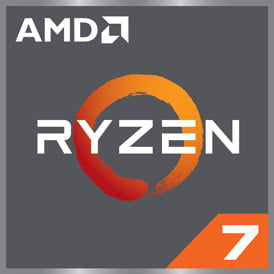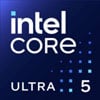
AMD Ryzen 7 2800H Benchmark, Test and specs
Last updated:
The AMD Ryzen 7 2800H has 4 cores with 8 threads and is based on the 1. gen of the AMD Ryzen 7 series. The processor uses a mainboard with the FP5 socket and was released in Q4/2018. The AMD Ryzen 7 2800H scores 734 points in the Geekbench 5 single-core benchmark. In the Geekbench 5 multi-core benchmark, the result is 3,088 points.

| Name: | AMD Ryzen 7 2800H |
|---|---|
| Family: | AMD Ryzen 7 (67) |
| CPU group: | AMD Ryzen 2000H (2) |
| Architecture: | Raven Ridge (Zen) |
| Segment: | Mobile |
| Generation: | 1 |
| Predecessor: | -- |
| Successor: | -- |
CPU Cores and Base Frequency
The AMD Ryzen 7 2800H has 4 CPU cores and can calculate 8 threads in parallel. The clock frequency of the AMD Ryzen 7 2800H is 3.30 GHz (3.80 GHz). The number of CPU cores greatly affects the speed of the processor and is an important performance indicator.
| CPU Cores / Threads: | 4 / 8 |
|---|---|
| Core architecture: | normal |
| Cores: | 4x |
| Hyperthreading / SMT: | Yes |
|---|---|
| Overclocking: | No |
| Frequency: | 3.30 GHz |
| Turbo Frequency (1 Core): | 3.80 GHz |
| Turbo Frequency (4 Cores): | -- |
Internal Graphics
The AMD Ryzen 7 2800H has integrated graphics, called iGPU for short. Specifically, the AMD Ryzen 7 2800H uses the AMD Radeon RX Vega 11 (Raven Ridge), which has 704 texture shaders and 11 execution units. The iGPU uses the system's main memory as graphics memory and sits on the processor's die.
| GPU name: | AMD Radeon RX Vega 11 (Raven Ridge) |
|---|---|
| GPU frequency: | 1.30 GHz |
| GPU (Turbo): | No turbo |
| Compute units: | 11 |
| Shader: | 704 |
| Hardware Raytracing: | No |
| Release date: | Q1/2018 |
| Max. displays: | 3 |
|---|---|
| Generation: | 8 |
| Direct X: | 12 |
| Technology: | 14 nm |
| Max. GPU Memory: | 2 GB |
| Frame Generation: | No |
Hardware codec support
A photo or video codec that is accelerated in hardware can greatly accelerate the working speed of a processor and extend the battery life of notebooks or smartphones when playing videos.
| h265 / HEVC (8 bit): | Decode / Encode |
|---|---|
| h265 / HEVC (10 bit): | Decode / Encode |
| h264: | Decode / Encode |
| VP8: | Decode / Encode |
| VP9: | Decode / Encode |
| AV1: | No |
|---|---|
| AVC: | Decode / Encode |
| VC-1: | Decode |
| JPEG: | Decode / Encode |
Memory & PCIeThe processor can use up to 32 GB memory in 2 (Dual Channel) memory channels. The maximum memory bandwidth is 51.2 GB/s. The memory type as well as the amount of memory can greatly affect the speed of the system. |
|
| Memory type: | Memory bandwidth: |
|---|---|
| DDR4-3200 | 51.2 GB/s |
| Max. Memory: | 32 GB |
| Memory channels: | 2 (Dual Channel) |
| ECC: | Yes |
| PCIe: | 3.0 x 12 |
| PCIe Bandwidth: | 11.8 GB/s |
Thermal ManagementThe thermal design power (TDP for short) of the processor is 45 W. The TDP specifies the necessary cooling solution that is required to cool the processor sufficiently. The TDP usually gives a rough idea of the actual power consumption of the CPU. |
|
|---|---|
| TDP (PL1 / PBP): | 45 W |
| TDP (PL2): | -- |
| TDP up: | 35 W |
| TDP down: | 54 W |
| Tjunction max.: | 95 °C |
Technical details
The AMD Ryzen 7 2800H is made in 14 nm. The smaller the manufacturing process of a CPU, the more modern and energy-efficient it is. Overall, the processor has 4.00 MB cache. A large cache can greatly speed up the processor's speed in some cases such as games.
| Technology: | 14 nm |
|---|---|
| Chip design: | Chiplet |
| Socket: | FP5 |
| L2-Cache: | -- |
| L3-Cache: | 4.00 MB |
| AES-NI: | Yes |
| Operating systems: | Windows 10, Linux |
| Virtualization: | AMD-V, SVM |
|---|---|
| Instruction set (ISA): | x86-64 (64 bit) |
| ISA extensions: | SSE4a, SSE4.1, SSE4.2, AVX2, FMA3 |
| Release date: | Q4/2018 |
| Release price: | -- |
| Part Number: | -- |
| Documents: | Technical data sheet |
Rate this processor
Benchmark results

The benchmark results for the AMD Ryzen 7 2800H have been carefully checked by us. We only publish benchmark results that have been created by us or that have been submitted by a visitor and then checked by a team member. All results are based on and fullfill our benchmark guidelines.
Geekbench 5, 64bit (Single-Core)
Geekbench 5 is a cross plattform benchmark that heavily uses the systems memory. A fast memory will push the result a lot. The single-core test only uses one CPU core, the amount of cores or hyperthreading ability doesn't count.

|
Intel Celeron G3900
2C 2T @ 2.80 GHz |
||

|
Intel Pentium G3430
2C 2T @ 3.30 GHz |
||

|
Intel Pentium G3440
2C 2T @ 3.30 GHz |
||
|
|
AMD Ryzen 7 2800H
4C 8T @ 3.80 GHz |
||

|
Qualcomm Snapdragon 860
8C 8T @ 2.96 GHz |
||

|
Intel Core i7-2960XM
4C 8T @ 3.70 GHz |
||

|
Intel Core M-5Y71
2C 4T @ 2.90 GHz |
||
Geekbench 5, 64bit (Multi-Core)
Geekbench 5 is a cross plattform benchmark that heavily uses the systems memory. A fast memory will push the result a lot. The multi-core test involves all CPU cores and taks a big advantage of hyperthreading.

|
AMD Ryzen 3 2300X
4C 4T @ 3.80 GHz |
||

|
Intel Core i5-7500
4C 4T @ 3.60 GHz |
||

|
Intel Core i7-3840QM
4C 8T @ 2.80 GHz |
||
|
|
AMD Ryzen 7 2800H
4C 8T @ 3.30 GHz |
||

|
MediaTek Kompanio 1300T
8C 8T @ 2.60 GHz |
||

|
Intel Core i5-7600T
4C 4T @ 3.50 GHz |
||

|
AMD Ryzen 5 3500C
4C 8T @ 2.50 GHz |
||
iGPU - FP32 Performance (Single-precision GFLOPS)
The theoretical computing performance of the internal graphics unit of the processor with simple accuracy (32 bit) in GFLOPS. GFLOPS indicates how many billion floating point operations the iGPU can perform per second.

|
Qualcomm Snapdragon 8 Gen 2 for Galaxy
Qualcomm Adreno 740 @ 0.72 GHz |
||

|
Intel Core Ultra 5 125U
Intel Iris Xe 4 Core Graphics 64 EUs (Meteor Lake) @ 1.85 GHz |
||

|
Intel Core Ultra 5 125UL
Intel Iris Xe 4 Core Graphics 64 EUs (Meteor Lake) @ 1.85 GHz |
||
|
|
AMD Ryzen 7 2800H
AMD Radeon RX Vega 11 (Raven Ridge) @ 1.30 GHz |
||

|
AMD Ryzen 5 3400GE
AMD Radeon RX Vega 11 (Raven Ridge) @ 1.30 GHz |
||

|
AMD Ryzen 5 PRO 3400GE
AMD Radeon RX Vega 11 (Raven Ridge) @ 1.30 GHz |
||

|
AMD Ryzen Embedded V1807B
AMD Radeon RX Vega 11 (Raven Ridge) @ 1.30 GHz |
||
Estimated results for PassMark CPU Mark
Some of the CPUs listed below have been benchmarked by CPU-monkey. However the majority of CPUs have not been tested and the results have been estimated by a CPU-monkey’s secret proprietary formula. As such they do not accurately reflect the actual Passmark CPU mark values and are not endorsed by PassMark Software Pty Ltd.

|
AMD FX-8150
8C 8T @ 4.20 GHz |
||

|
Intel Core i3-9350K
4C 4T @ 4.20 GHz |
||

|
Intel Core i3-9350KF
4C 4T @ 4.20 GHz |
||
|
|
AMD Ryzen 7 2800H
4C 8T @ 3.30 GHz |
||

|
AMD Athlon Gold Pro 3150G
4C 4T @ 3.50 GHz |
||

|
AMD EPYC Embedded 3151
4C 8T @ 2.70 GHz |
||

|
Intel Core i7-5775C
4C 8T @ 3.50 GHz |
||
Benchmarks

Geekbench 5 (SC)
2,488 entries
2,488 entries

Geekbench 5 (MC)
2,461 entries
2,461 entries

FP32 SP (iGPU)
2,042 entries
2,042 entries

PassMark CPU-Mark
2,392 entries
2,392 entries
Popular comparisons
back to index








